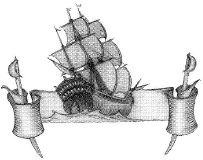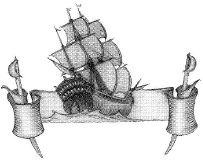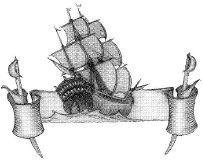Peter and the Starcatchers (26 page)
Read Peter and the Starcatchers Online
Authors: Dave Barry,Ridley Pearson
Tags: #Juvenile Fiction, #Fiction, #General, #Family, #Social Science, #Fantasy, #Action & Adventure, #Magic, #Friendship, #Pirates, #Juvenile Nonfiction, #Orphans, #Nature & the Natural World, #Humorous Stories, #Orphans & Foster Homes, #Adventure and Adventurers, #Islands, #Folklore & Mythology, #Characters in Literature

They hadn’t moved much, but they were
changing.
And
fast.
They stil had their tails, though these had grown longer and more graceful. In their midsections, their bodies narrowed and their skin changed abruptly, from rough green scales to a white, fleshy smoothness. This fleshy, forward section now grew larger; a distinct head appeared, separating from the trunk by a slender neck. The eyes, original y on opposite sides of the head, moved closer together. The mouth became smal er, and a bulge of flesh started to protrude above it; ears were sprouting on each side of the head.
On the trunk, the dorsal fin now shrank, absorbed by the body, while the pectoral fins stretched longer, with the ends splaying into distinct fingers of tissue.
These creatures were not human; their features were stil crude, their flesh startlingly white, their eyes, huge, shining, almost luminescent.
No, they weren’t human. But they were no longer fish, either. And with each moment, as their bodies became less fishlike, so did their brains. No longer were they “thinking” only in simple survival urges—
move, eat, fight, flee.
Now their thoughts were far more self-aware and complex. And, more and more, these thoughts centered on the cause of their wondrous transformation.
They were thinking about the trunk.

ESCAPE
L
ITTLE RICHARD WAS DRENCHED IN MILK, and the cow was none too happy. But the iron brig door hung open.
“Good job,” said Slank.
“Next time, you milk the cow,” said Little Richard.
Slank led the way quietly out of the cel . A few yards away was another cel ; in it lay Mrs. Bumbrake, sound asleep, snoring. Slank barely glanced at her as he led Little Richard through the ship’s stores. They entered a narrow corridor, where Little Richard’s huge bulk touched both wal s; then they came to a ladder, which led up to the
Jolly Roger’
s gal ey.
The ship’s cook never saw them coming. He became aware of them only when he felt Little Richard’s enormous paw pick him up by the neck and toss him casual y down the ladderway, like a sack of flour.
With that taken care of, Little Richard, always hungry, grabbed a loaf of bread and stuffed it, whole, into his mouth.
Slank, meanwhile, looked for weapons, grabbing several knives, and handing Little Richard a massive iron skil et.
Thus armed, they headed back toward the ladderway. Slank knew that, with Stache gone, the crew would be slacking. Most likely the only man awake would be the lookout.
“You head straight to the crow’s nest,” he whispered to Little Richard. “Bonk him on the head quietly.” Little Richard nodded. They poked their heads out into the fresh salt air. Sure enough, the crew was sprawled helter-skelter on the deck, snoozing in the sunshine. Nothing moved but a scrawny red chicken.
Little Richard pushed past Slank, and, with astonishing stealth for his bulk, slipped over to the mainmast and began to climb. A minute later, Slank heard the
thonk!
of the skil et.
The lookout was now napping as wel .
With a kitchen knife, Slank quietly cut some strips of sailcloth and lengths of rope. Then he and Little Richard took care of the rest of the crew, one by one: the big man would clap his huge hand over a sleeping pirate’s mouth, holding him firmly while Slank quickly gagged and bound him.
When the pirates had al been subdued, Little Richard, feeling prankish, hoisted and slung them over the main boom, like human laundry hung out to dry. There was dark fury in the eyes of the pirates, thoroughly humiliated by being taken prisoner, without a fight, on their own ship,
by two men.
But there was nothing the pirates could do. They weren’t going anywhere, and Black Stache no longer had any backup from his ship.
While Little Richard was hanging the laundry, Slank located four pistols and two swords. Then, with the pirates watching sul enly, Little Richard single-handedly lowered a dory
—normal y the job of four men—over the starboard rail, where it couldn’t be seen from the island.
Little Richard climbed over the rail and slid on a rope down to the boat. As Slank prepared to do the same, he turned toward the glaring pirates, blew them a dainty kiss, and shouted, “Ta ta, ladies!”
Turning his back to them, he reached beneath his shirt and pul ed out a gold locket, checking to be sure the chain was intact. He replaced it, grabbed the rope, and slid down to the boat, where Richard was already at the oars. Slank cast off; Little Richard dug the oars into the water and gave a mighty backward heave; the dory shot forward. Slank reached down and touched the blade of his sword; a thin line of blood instantly appeared on his thumb.
Nice and sharp.
As they rounded the stern of the
Jolly Roger,
the island came into view. The longboat Stache had used to go ashore was pul ed up on the beach, but there were no men in sight.
“Take us straight in,” Slank commanded, his hand on the sword handle. “We have an appointment with Mr. Stache.”

CAPTURED
J
AMES STARED, FEAR-FROZEN, at the feet in front of his face. They were like no feet he’d ever seen before: sun-bronzed, calused, with long, curling yelow toenails. Not Alf’s feet. Not pirate feet, either.
Savages.
For several eternal seconds, James kept his eyes on the feet, too terrified to lift his head and look at their owners. His body was rigid with terror as he waited for the savages to do something horrible to him—bash his head with clubs, or stab him with spears, or…
…or tap him on the shoulder.
James flinched violently when the finger touched him. From above, he heard chortling.
They’re laughing.
Slowly, James raised his head, taking in two pairs of sturdy brown legs, leading up to two filthy loincloths made of some kind of woven fiber; then two muscular torsos, and, final y, the faces of his captors.
They were young men, in their mid-twenties, one slightly tal er than the other. Their faces, framed by shoulder-length jet-black hair, were enough alike that the men could have been brothers: both had high cheekbones, jutting angular noses, and dark, deep-set eyes.
They did, in fact, have spears—dark wooden shafts topped with bright-pink tips, apparently fashioned from sharpened shel s. But they held the spears upright, and their bemused expressions told James that they weren’t planning to stab him.
Not right now, anyway.
For a moment James regarded the savages, and they him. Then the tal er one made a lifting gesture with his nonspear hand, which James understood to mean that he was to stand. Legs trembling, he stood. Immediately, the shorter man turned and slipped into the jungle. The tal er one gestured that James was to fol ow his companion. James stumbled forward, trying to keep up with the shorter man, who seemed to move effortlessly through the thick vegetation. The tal er man fol owed close behind James, occasional y prodding him with a finger when they fel too far behind.
They walked in silence, not stopping, for maybe fifteen minutes; James couldn’t tel how the savages knew where they were going, but clearly they did, because suddenly they came to a large clearing, roughly circular, easily two hundred feet across. In the center of the clearing was a cluster of enormous trees, unlike any James had seen. Their stout branches, extending outward horizontal y, were supported by thick, rootlike shoots that reached down to the ground, forming a labyrinth of columns that surrounded the massive main tree trunks.
James could see people moving around in the shadowy interior of the tree fortress; there appeared to be dozens of them, dark-haired and brown-skinned like his captors, men and women, some of them children. They were speaking, but in a strange language that consisted mostly of guttural sounds and a strange clicking noise.
As James neared the trees, his attention was drawn to a place at the far end of the clearing. There a half dozen men holding spears were loosely gathered around a smal group of people seated on the ground.
One large person, and three smal ones.
Alf and the boys.
James’s knees went weak with relief. Prodded, unnecessarily, by the savage behind him, he stumbled toward his mates, who turned toward him as he approached. He saw worry on Alf’s face, and fear on those of Prentiss, Thomas, and Tubby Ted. James, suddenly aware of his exhaustion, plopped down next to Prentiss.
The two savages who’d captured him exchanged a rapid series of odd sounds with the others in the circle. Then they fel silent, watching the captives, expressionless.
Alf glanced up at the men, then turned to James. “You al right, lad?” he whispered.
“Yes, sir,” said James. He turned to the other boys. “You al right?”
“I’m sc—scared,” said Prentiss, his voice shaking. “When you left to look for Ted, they c—came out of nowhere, and th—they…” He stopped, his shoulders shaking with sobs. James put his arm around Prentiss and said, “It’s okay. We’l be okay.”
“Oh,
right,
” sneered Tubby Ted. “We’l be just
fine.
”
James shot Tubby Ted a be-quiet look, but Ted wasn’t finished.
“You
got us into this,” he said. “You said we should go into this stupid jungle. And
now
look where you’ve got us. Captured by savages. Thanks to you we’l be kil ed and
eaten.
” Now Prentiss and Thomas were both sobbing.
“Ted,” said James, his voice low but furious, “if you keep that up, I’l kil you myself, you understand? We don’t know what they plan to do. So far they haven’t done anything to us.
They may be friendly. Right, Alf?”
The boys looked at Alf.
“Erm…
right,
” said Alf, not at al believably. “They could be very friendly.”
“Then why did they capture us?” whispered Prentiss. “Why are they watching us like this? What are they going to do?”
“I dunno,” said Alf. “But I aim to talk to them.”
“But how, sir?” said James. “They make those…those
noises.
”
“I know,” said Alf. “But I’ve heard some tales in my time about how you talk to a savage. The trick is, keep it simple.”
“What do you mean?” said James.
“Watch,” said Alf. Slowly, he got to his feet; the savages shifted a bit, getting closer to him, but not stopping him. Alf faced the savage closest to him, an older man, perhaps in his forties. Solemnly, Alf raised his right hand, palm out.
“How,” he said.
The savage studied Alf for a moment, then turned and grunt-clicked something to his comrades, who laughed. Then the savage turned back to Alf, and, transferring his spear to his left hand, raised his right hand, and said: “How.”
Alf looked quite surprised.
“Now, what?” whispered James.
“I dunno,” said Alf. He hadn’t real y planned it out. His mind raced frantical y, but nothing came. Final y he decided to stick with what had been working so far. He raised his palm again.
“How,” he said.
This elicited more grunts and clicks from the older savage to his co-savages, who responded with more laughter. The older savage then turned to Alf again, and again raised his hand and uttered another solemn “How.”
Alf pondered his next move. On the one hand, the savages seemed to be responding reasonably wel to “How.” On the other hand, they real y weren’t making much progress.
At
least they’re not eating us,
he thought.
Ten seconds went by, then twenty, as Alf looked at the older savage, and the older savage looked at Alf. Final y, out of sheer nervousness, and unable to think of what else to do, Alf raised his right hand again. But this time, just as Alf began to speak, the savage rotated his spear from the vertical to the horizontal, pointing it toward Alf’s chest. Alf stopped in mid “How,” staring at the sharp pink spear tip, inches from his heart.
And then the savage spoke.
Poking his spear tip against Alf’s chest, he said: “Can we move this conversation along, old chap? I’m getting frightful y tired of ‘How.’”

